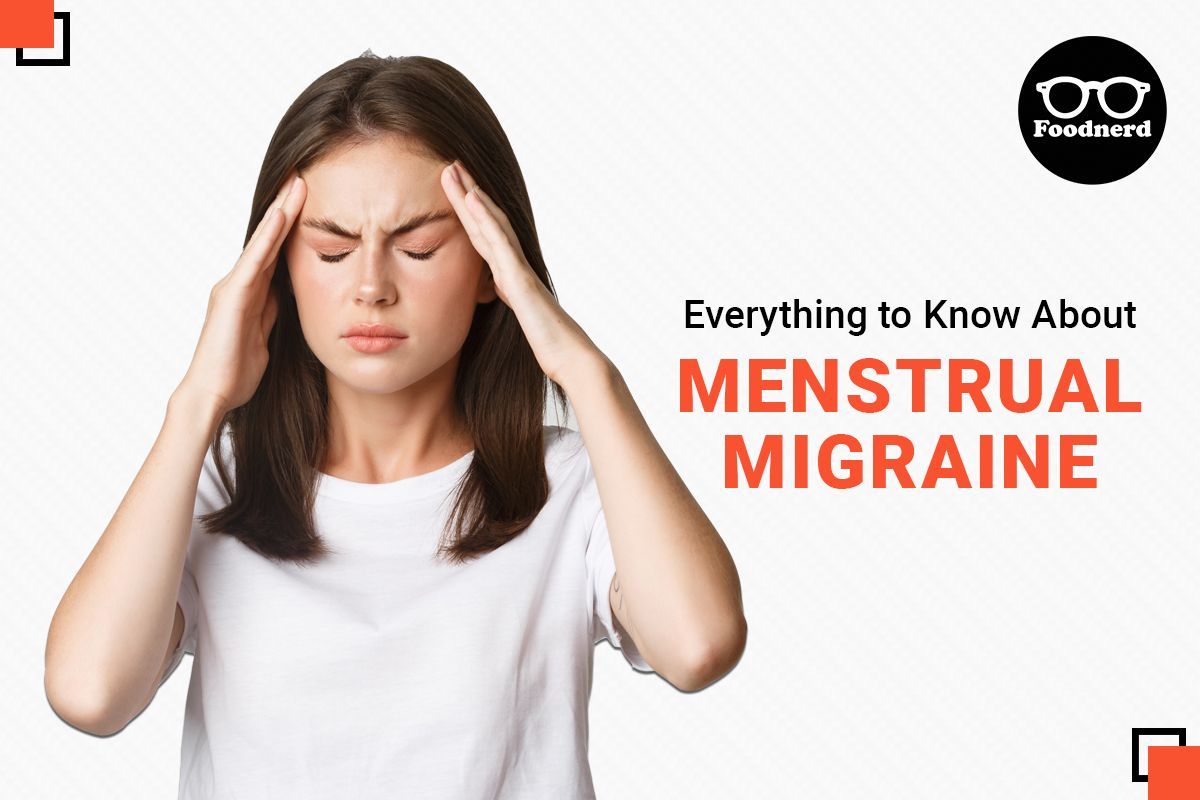
- Nubaira Ahmer khan"
- Apr 08
- 0 Comments
- 0 Likes
Female migraine is more common than male, and it is due to hormonal changes in women throughout their lives. Menstruation (having a period) triggers more than half of women with migraines. Here you will find out everything about menstrual migraine. Read more to know more.
Menstrual Migraine
The term "menstrual migraine" refers to headaches that occur during your period and are thought to be due to your menstrual cycle. Patients with these conditions are more likely to be resistant to therapy. Migraine headaches can continue longer than other forms of headaches.
Migraines are associated with menstruation, also known as hormone headaches. They might worsen with movement, light, smell, or sound in the days leading up to or immediately following a woman's period.
Symptoms
The menstrual migraine symptoms are the same as those of other types of migraine that don't have an aura or other sensory symptoms. They usually start about 1 or 2 days after you start your period. Menstrual migraine is of two types:
Menstrual Migraine
This is the most common type, and it can have or not have symptoms like vision problems. You may have migraines at other times of the month.
Pure Menstrual Migraine
This typically happens only at the start or end of your period.
Menstrual migraine symptoms include the following:
· Nausea
· Vicinity
· Beating head pain, usually on one side of the head
· Makes you sensitive to loud noises and light
People who have premenstrual syndrome (PMS) may have symptoms like:
· Bloating
· Breast tenderness
· Nausea
· Mood changes when they have migraines during their periods.
read
Top 5 Best Milk Powder For Newborn Baby
Causes
There is a link between migraines and a drop in the hormone estrogen. Females have menstrual migraines because of a decline in estrogen levels before starting their period. Women with heavy and painful periods have more of another hormone called prostaglandin, linked to menstrual migraine.
Other possible reasons:
Taking the Combined Pill
Combined oral contraceptive pills can help some women with their headaches, but others report more headaches, especially when they don't take them and estrogen levels drop.
The Menopause
Headaches usually worsen as you near menopause. Because your periods come more often, and there is a disruption in your hormone cycle.
Pregnancy
Headaches can get worse in the first few weeks of pregnancy. They usually get better or stop entirely in the last six months. They don't hurt the baby.
Treatment
An experienced Gynecologist can give any of the following treatment options depending upon the patient.
Migraine Medicines
Your doctor can give you migraine medicines to take around the time of your period so that you don't get them. These don't have hormones in them, but they can help stop the headaches from coming. Triptans tablets and a painkiller called mefenamic acid are on the list of things that help.
Continuous Contraceptive Pills
It's essential to tell the gynecologist if you think the contraceptive pills you're taking are making your headaches worse. If you get headaches when you don't take the pills, continuously take them without pause. This way, you won't have a sudden drop in estrogen.
Replacement Therapy for Hormones
Migraines are one of the types of headaches that become more common as women reach menopause because their hormones change, making them more common.
Hormone replacement therapy (HRT) helps treat hot flushes and sweats.
These types of HRT are better for people who have migraines because they keep hormone levels more stable and are less likely to cause migraines.
Therapy With Estrogen
An estrogen gel or patch that you use before and during your period can be prescribed by a doctor. But usually, these medications are not defined.
Preventive Measures
You can try these tips to avoid a migraine:
· It's essential to eat small, frequent snacks to keep your blood sugar level stable. Attacks can happen if you don't eat for a long time or miss a meal.
· Small snacks before going to sleep and always eating breakfast are helpful.
· Sleep at the same time each night, and don't get up too early or stay up too late.
· Avoid being stressed out.
Read
Soft & Chewy Granola Bars; New Trend, New Addiction
According to Marham.pk , if you cut back on stress from one day to the next, you might get headaches. When someone lets down, it's called the "let down" effect.
Trying to keep stress down in general and deal with it as soon as you notice it may help.
Getting rid of stress and anxiety may seem hard to do, but there are simple steps you can take every day. Try some meditation or yoga after you wake up or before you go to bed.
A review of studies shows that aerobic exercise may shorten the time migraines last. Another study says that regular exercise may help keep people healthy.
Stay hydrated, eat a high-protein meal before exercising, and warm up your muscles to get the most out of your workout.
Foods to Prevent Menstrual Migraine
Here are some good foods that can help you to deal with menstrual migraine
Food Rich in Magnesium
According to research, magnesium is more beneficial than a placebo in treating menstrual migraines. You can use magnesium-rich food to avoid menstrual migraine, such as:
· Bananas
· Avocados
· Leafy green vegetables
· Fatty fish
· Dark Chocolate, etc.
Food Containing Vitamin B2
Vitamin B2, or riboflavin, is a vitamin that has been shown to reduce the frequency and severity of menstrual migraines in particular women. Foods that include it are:
· Dairy products suchas Milk, yogurt, and eggs
· Almonds
· Green vegetables
Food Containing Coenzyme Q10
As one of the primary energy sources within cells, CoEnzyme Q10 is present throughout the human body. You can prevent menstrual migraine with this enzyme's potent anti-oxidative effects.
· Chicken
· Broccoli
· Cauliflower
· Strawberries
· Oranges all contain coenzyme Q10.
Food Supporting Estrogen
Women should consume a diet rich in foods that aid in the production and regulation of estrogen.
· Seeds like flax and sesame
· Fiber fruits and vegetables
· Ginseng
· Carrots
· Sauerkraut is some of the greatest foods for estrogen support.
If you have tried everything and nothing seems to work, you can consult Best Gynecologist through Marham. Through Marham, you can book an appointment with just a few clicks.
Read
Can Ice-cream Help You Lose Weight
Recent Blogs
The Top 10 Amazing and Popular Arabian Dishes
The Middle East and North Africa are home to a wide variety of delectable Arabic dishes. It is a cuisine with Mediterranean, Persian, and Indian influences that captures the history, culture, and g...
Best Places To Get (Egg Burger) Anday Wala Burger In Rawalpindi
Everyone is a fan of the zinger burger, the cheese burger, the beef burger, or different other types of burgers, but no one appreciates that there is a separate fan base for the Anday wala burger (...
Famous Fish Spots In The Twin Cities Of Pakistan You Must Try
In the winter, we naturally crave warm soup or perfectly grilled fish that is perfectly tender and juicy in flavor. And when we eat the freshly fried fish dipped in sauce, it gives us the best feel...




 Facebook
Facebook Instagram
Instagram
Write a Comment